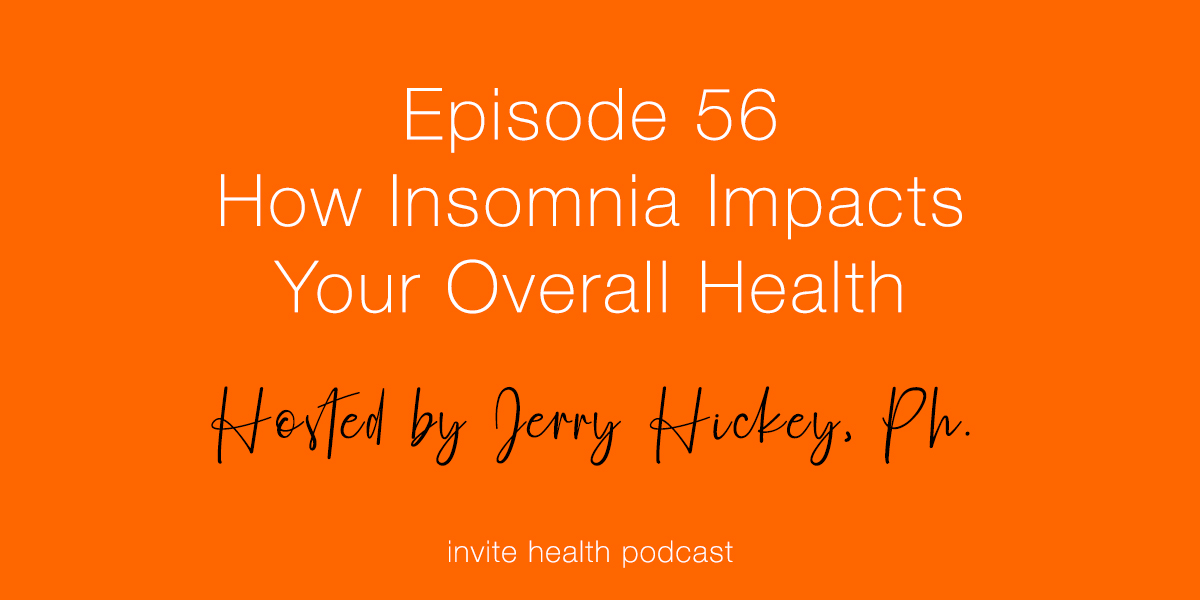How Insomnia Impacts Your Overall Health – Invite Health Podcast, Episode 56

Invite Health Podcast, Episode hosted by Jerry Hickey. Ph
Subscribe Today!
Anyone can have a bad nights sleep, but when it is persistent and beyond your control it is called insomnia. Sleep is a cure-all, but insomnia is just the opposite; it can damage your health and sometimes shorten your life.
The Impact Insomnia Has On Your Health
Insomnia is the inability to fall asleep or stay asleep for as long as you need. Poor quality sleep, or not having enough, impacts exercise, your work performance, sexual function and more. It can also overtime permanently effect your health.
Not enough sleep can contribute to weight gain, poor ability to exercise, an a heightened risk of diabetes. Lack of sleep effects your brain; it leads to poor mental performance and depression. In fact, people with insomnia are five times more likely to develop depression. Poor sleep also impacts your heart, and puts you at risk for high blood pressure, heart disease, heart attack and stroke.
Being sleepy also causes accidents; the National Highway Traffic Safety Administration estimates that fatigue is a cause in 100,000 auto crashes a year in the United States. Lack of sleep impairs your attention, alertness, concentration, memory, reasoning and your problem solving.
Lack of sleep also ages your skin. Many people have experiences puffy eyes after a few nights of missed sleep. But it turns out that chronic sleep loss can lead to lackluster skin, fine lines (which are the start of wrinkles), and dark circles under the eyes. Excess cortisol in your bloodstream can break down the Collagen in your skin. Collagen makes up 70% of your skin and it is the protein that keeps your skin smooth, elastic and wrinkle free.
When you don’t get enough sleep, your body less human growth hormone. During aging, human growth hormone helps increase your muscle mass, thickens your skin, and strengthens your bone.
What about Drugs for Sleep?
Drugs are dangerous. You have heard about the opioid crisis and have heard about the number of people who overdose or have become addicted to opiates. Issues with sleep medications are right behind that in number. You just aren’t hearing about that because opioid issues are dominating the airwaves.
Lifestyle Changes to Improve Sleep Duration and Quality
Did you know there is a sleep and exercise connection? Insomnia has been shown to improve with regular exercise. So, adding exercise to your daily routine can improve the quality and length of your sleep.
Make sure you are powering down your electronic devices. The soft blue light from a cell phone, a tablet, a digital clock in your bedroom, even that light from your cable box can keep you awake and impact sleep. Turn off your electronic devices about an hour before you go to bed.
You can set your body clock by going to sleep and waking up at the same time every day, even on weekends. This is extremely important now that we are all practicing social isolation and even quarantine – it may be hard to get your body on track to waking up and falling asleep, but try to push yourself to keeping a similar sleep/wake schedule every day. This can help you reset your circadian rhythm, which is your body’s clock.
Look for hidden caffeine and stimulants in food and beverages. Besides coffee, tea and chocolate (the obvious sources of caffeine), some sodas, ice creams, and certain medications for coughs, colds, fevers and weight loss contain stimulants.
Be careful with alcohol. It can at first put you to sleep, but later in the night it has been connected to poor sleep quality and waking up multiple times.
Natural Remedies to Improve Sleep
If you are stressed out or your brain is just overly active, you have to shut down your brain and prepare it for sleep. A way to do that is using L-Theanine. This is an interesting supplement that comes from the tea plant. Before sleep I recommend about 200mg. In the daytime, if you take 100mg of L-Theanine it is excellent for stress, staying focused, it helps you be a little creative. It has been shown to relieve the effects of stress hormones, which can make you jittery and unfocused. At night, if you are releasing stress hormones, the hormones can keep you awake. This can be counteracted by L-Theanine. This is a non-habit forming, very gentle supplement.†
Melatonin can also help. A recent review from MIT showed that when researchers analyzed human clinical trials on Melatonin and sleep, they concluded that Melatonin can improve your quality of sleep. It can also decrease the sleep onset latency (falling asleep faster) and make you sleep deeper and longer. Melatonin has also been shown to reset your body’s clock, or your circadian rhythm.†
Thank you for tuning in to the Invite Health Podcast. You can find all of our episodes for free wherever you listen to podcasts or by visiting www.invitehealth.com/podcast. Make sure you subscribe and leave us a review! Follow us on Facebook, Twitter and Instagram at Invite Health today. We’ll see you next time on another episode of the Invite Health Podcast.
